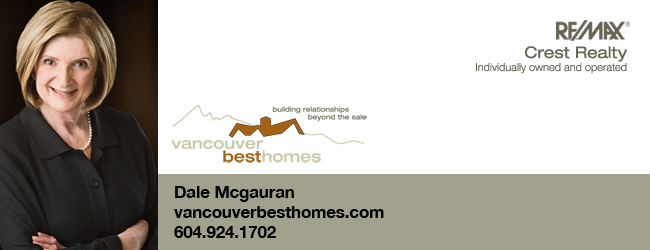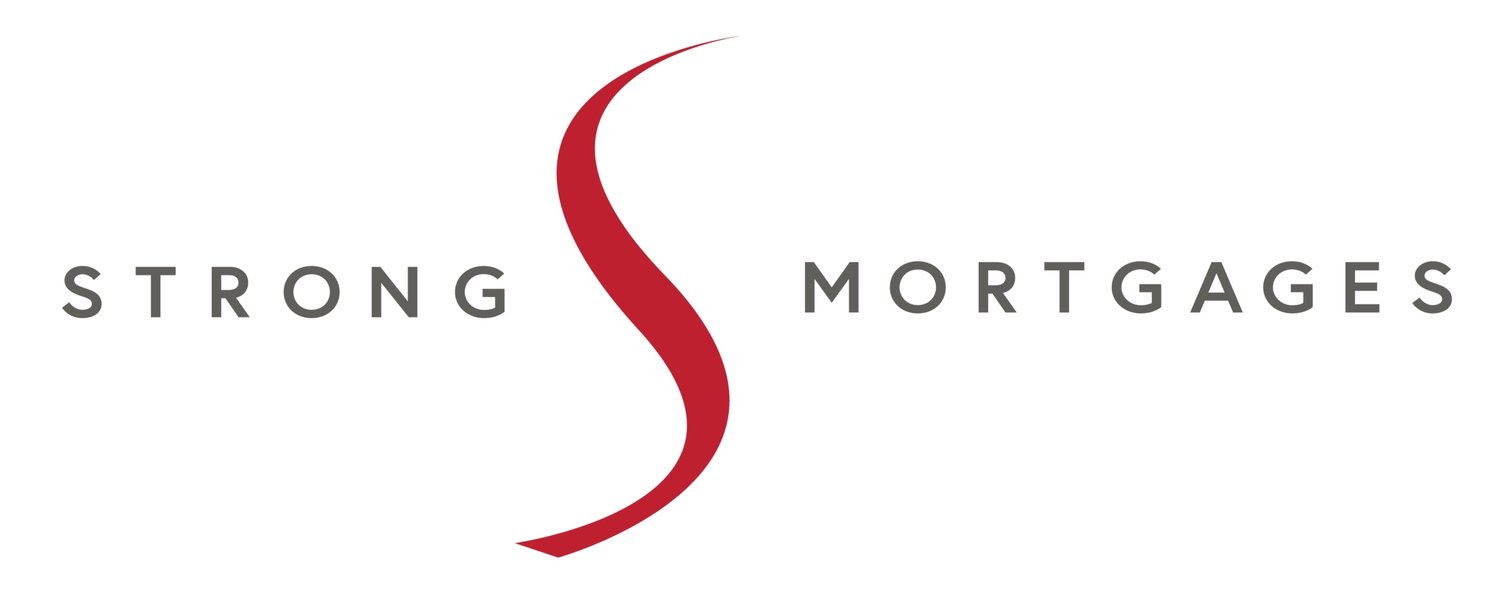[dropshadowbox]

[/dropshadowbox]
BUSINESS BASICS
Started as a Realtor in: In 2004 after moving from Toronto, Ontario where she produced television and corporate video for 30 years. Dale started in real estate with only three contacts in Vancouver. She set a goal to find one buyer or seller at every open house she hosted. Selling 27 homes in her first year, Dale has been a member of the medallion club ever since, recognized as the top 10% of all realtors in the Greater Vancouver area.
Specialization: Dale lives, works and plays on the North Shore (North Van & West Van) and is very knowledgeable about the Downtown market as well.
One-piece of advice for your clients: The realtor you work with is a huge investment on your part. Make sure you can trust them, they are experienced, knowledgeable, reputable, know the market and most importantly – that you like them.
Why RE/MAX? It is a Global real estate franchise network that spreads across more than 80 countries and 8 territories on 6 continents. The RE/MAX “balloon” logo is one of the most recognized business logos in the world. “RE/MAX is the only company that I interviewed with. I never have to explain which company I am with. It has connections and referrals worldwide. It’s #1 in my eyes.”
Dale’s ongoing real estate education: She stays current in the market through the traditional training requirements with the Real Estate Board, CREA and RE/MAX, but is also working with the Richard Robbins Coaching program and is a member of REIN (Real Estate Investment Network) . Her experience with REIN has been unbelievable. Headed by Don Campbell, he uncovers details on local and worldwide markets, and educates with a behind the scenes tour of what’s really going on in real estate; knowledge that Dale continually applies to her personal and professional investing strategies.
Dale’s team: This past year Dale and Dan Pigott partnered under the branding of “Vancouver Best Homes”. Dale feels blessed to be working with such an amazing person –Dan has very similar morals, values, ethics and goals. Between the two of them they cover every possible client need.
Q & A
1. What differentiates you from the 11,000 licensed real estate agents in the Greater Vancouver area?
I’m interested in building the relationship well beyond the sale. I truly do care and I go way beyond…It’s important for me to have meaning in what I’m doing and it’s the relationship that’s important to me. I’m dedicated to personal service, but with a personal touch. But easy for me to speak about myself – I think my testimonials speak for themselves!
As a previous television producer, I have an eye for how things photograph and present. I provide complimentary de-cluttering and staging advice and I have a storage locker full of “fluff” that I use to help stage my listings. A picture is worth a thousand words and I do provide professional photos and high-quality marketing materials. My clients can clearly see the value in my services to convey my message of “class act” representation.
2. What was your favorite success story?
I had a client that bought a pre-sale in 2010 (without me & 2 years before it was complete) and then asked me to sell her current condo in 2012 before she took possession of the new condo. The market had taken a down-turn and for 5 months I did not have any interest in her condo. If I could not sell her condo, she would lose her healthy deposit on the pre-sale, which was her only savings! After a lot of stress and with a possession date only 1 month away for her to complete on her new home, I received a low-ball offer. Unfortunately, the bank would not approve her on the new condo as the offer was too low. I re-negotiated with the buyer and dealt with the Developer to make it all come together for a successful, happy ending. It was an extremely memorable, gratifying transaction and my client still thanks me every time I see her.
3. Who has been your most interesting client?
At an open house in West Van, I met a Producer/Director I had worked with at CBC in the 70’s. He is now producing Feature Films. We re-connected, have become friends and I helped him find a prestigious penthouse condo in Downtown Vancouver . It was a fun, interesting and challenging adventure to work with him again.
4. What inspired you to be a Realtor?
Even with 30 years of experience in broadcasting, my age posed challenges/limitations to finding the right career in Vancouver. But I was determined to find something that I was passionate about and once I decided on real estate, there was no looking back. I did not have a network in Vancouver but with a lot of hard work, I was able to grow my network and combine all of my previous experience in service, sales and marketing to provide my clients with a positive, memorable and successful experience in real estate.
5. How would your clients describe you?
I would say that they would describe me as a professional always working on their behalf; doing what it takes to be successful in the purchase or sale of real estate. I believe my best features are how well I listen to my clients and my attention to detail – truly going above and beyond.
6. Least favourite part of the job?
Dealing with the technology components, however, with Dan as my partner – well, he just excels in that department.
PERSONAL SNAP SHOT
About: Dale has a son and daughter, both with children of their own who live in the Metro Vancouver area. She has three greatly adored grandchildren (6, 4, and 2) with one on the way. Her son was her real estate partner for some time before he switched careers to the police force.
Giving back is not a choice but a moral obligation. She takes pride in donating a portion from every transaction to the Children’s Miracle Network and has recently joined Habitat for Humanity Greater Vancouver as a volunteer at the North Vancouver ReStore.
She likes to stay active through sports like hiking and skiing, but her biggest interest is in cars. She is a car nut and has a MX5 Miata to prove it, and you might just find her racing at the track.
Likes (If you had more time, what would you do more of): Travelling, time with the Miata club and mostly spending more time with her grandchildren. She would love to take them on a trip to Disneyland!
Loves (can’t live without): Spending time with her grandchildren – she describes it as her precious time and gives her life balance. The mountains and the ocean are also on the top of her list -loves finding new hiking trails or just walking the seawall in Kits, Stanley Park or West Vancouver.
Contact Dale
 This Campbell’s recipe is not only easy and no fuss, it’s darn delicious. The risotto can easily be served as a main dish, however, sometimes I omit the meat and have it as a side with steak, fish, or chicken breast.
This Campbell’s recipe is not only easy and no fuss, it’s darn delicious. The risotto can easily be served as a main dish, however, sometimes I omit the meat and have it as a side with steak, fish, or chicken breast.
 From a slow winter and spring, May jump started the summer market with an increase in sales, which continued through June and July. Prices increased, but at it’s slowest pace over the past four years.
From a slow winter and spring, May jump started the summer market with an increase in sales, which continued through June and July. Prices increased, but at it’s slowest pace over the past four years. My son, Jack, requests pancakes for breakfast on a regular basis, probably more for the syrup than than anything else, but these tasty cakes are the best – every single time. Sunday mornings are the perfect days for serving these yummy flapjacks, but they are also great for a breakfast dinner when you’re feeling lazy.
My son, Jack, requests pancakes for breakfast on a regular basis, probably more for the syrup than than anything else, but these tasty cakes are the best – every single time. Sunday mornings are the perfect days for serving these yummy flapjacks, but they are also great for a breakfast dinner when you’re feeling lazy.

